HAWTHORNE, Nev. — It’s a beautiful desert day in northern Nevada, and I’m hauling serious butt in the 2024 Can-Am Maverick R. With a tiny 1.0-liter, three-cylinder turbocharged engine squeaking out a whopping 240 horsepower, this new side-by-side is a force to be reckoned with. I’m in Sport+ mode, the paddle shifters controlling the new seven-speed dual-clutch transmission are clicking off the shifts, and I’ve got a huge grin on my face.
However, as I’m climbing a steep hill, I feel the worst thing possible: cocky. I’ve spent a day and a half sliding this thing through turns, barreling over rocks and catching air at every opportunity. What are the chances this ascent will go wrong for me?
Bad idea, Hall. Bad, bad idea. As I crest the hill, I realize too late the road turns to the right. Unfortunately, I do not do the same. I’m now to the left of my intended path, headed straight for a pair of humongous boulders spaced slightly narrower than the Maverick’s 77-inch width. “This,” I have time to think, “is going to be bad.”
I decide to hit the rock on the right, knowing full well that I risk breaking the Maverick’s new and very non-traditional long front spindle. Can-Am has moved the ball joint above the tire in this re-imagined Maverick, all in the name of reducing scrub radius and load on the tire. It looks a little crazy and was greeted with plenty of disdain on the internet when the first photos came out. Well, Can-Am, we’re about to see just how good your design really is.
The passenger tire hits the rock and I’m catapulted back towards the trail. I have a brief, heartstopping moment where I think I’m going to roll, but a quick flick of the steering wheel to the left – towards the dirt that seems perilously close to my face – saves it. I come to rest on the right side of the road, shiny side up and thanking the universe for my good fortune.
The wheel is shattered but the spindle is fine. There are some marks on it where the flat tire rubbed, but that’s about it. The lower arm, designed with a breakaway point so that in case of failure it breaks in a relatively safe place and doesn’t rip out of the hub, is bent a tiny bit. However, it is still safe for me to continue driving. We swap the flat out and the Maverick is back in business – and I am more than a bit humbled.
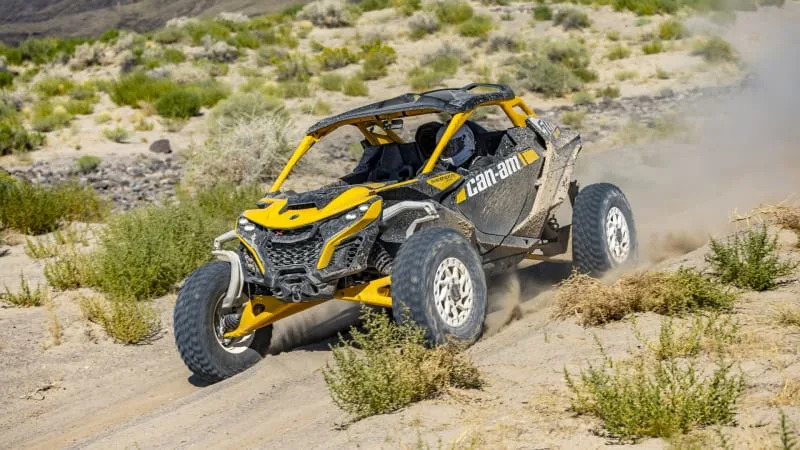
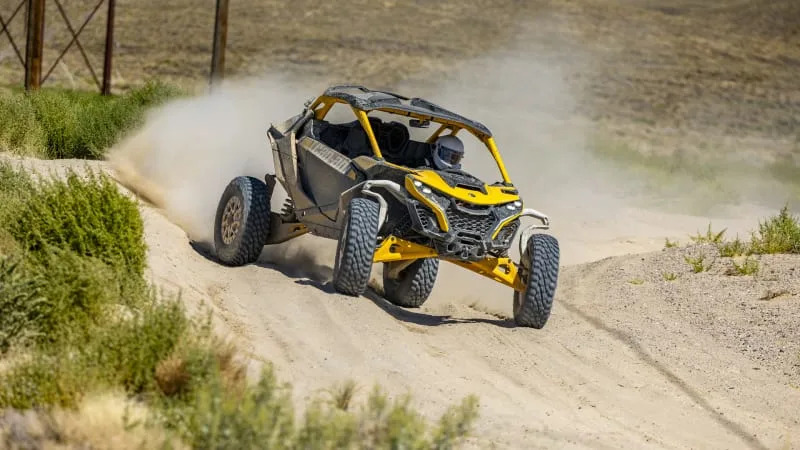
I started my drive the day before in the Can-Am a bit apprehensive. This two-seat, go-fast golf cart is like nothing I’ve ever driven before. With a top speed of nearly 100 mph, up to 26 inches of wheel travel, 17 inches of ground clearance and myriad suspension, engine and steering modes, the Maverick R is not for the faint of heart.
Within the first minute of my drive, I’ve got the Maverick up to 88 mph on a gravel road. It feels a little light, and that’s as far as I feel like pushing it. My GPS isn’t working – more on that later – and I miss my turn, ending up on what might have been a trail at one point, but recent rains have done some damage.
I come to a deep washout, so I switch from two- to four-wheel drive and attempt it. No dice. It’s too steep on the other side, even with the optional 32-inch Tenacity tires. But all is not lost. I switch from High to Low gear and roll on to the throttle. Still, it’s not enough to get the Maverick moving. There’s one more trick to try – a front locker. Thus engaged, the UTV manages to scramble out of the ditch. Go, me!
Soon I’m cruising along the Valley Off Road Racing Association’s Hawthorne 250 race course at speeds upwards of 50 mph. I’m an accomplished off-road racer, but my experience is with limited cars. Think class 11 stock Volkswagen Bugs and class 1600 buggies where it’s more about endurance than it is speed. This is the fastest I’ve gone in the dirt, full stop.
The Maverick has Sport and Sport+ modes, but I start off in Comfort, with plenty of power steering boost, a bit of a muted throttle and transmission, and the softest shock setting. My tippy-top tester includes the Fox 3.0 Smart Shox with live valve technology. This engineering magic takes in parameters like speed, pitch and yaw to dial in the ideal compression and rebound, adjusting up to 200 times per second. For the inevitable “oh shit” moment, the Fox can go from soft to hard valve settings in less than two-hundredths of a second. I tested this so you don’t have to, hitting a few ditches at speed without bottoming out the suspension.
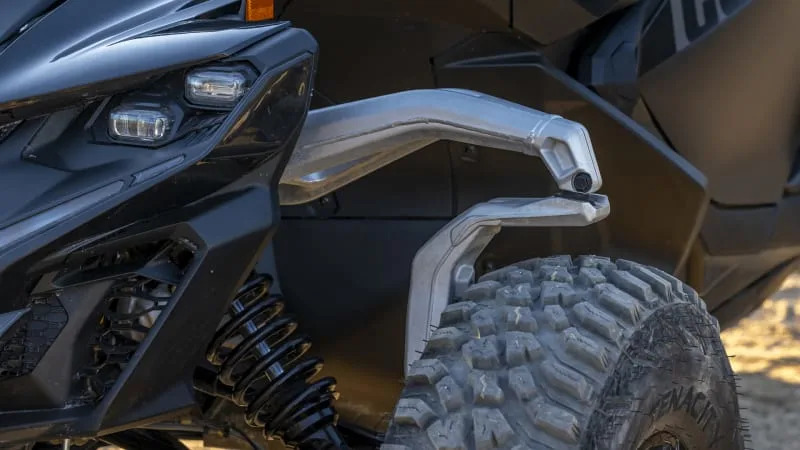
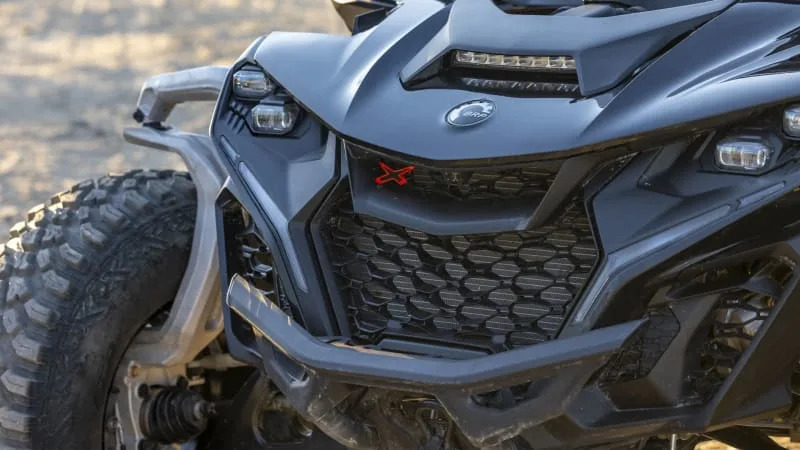
The Maverick R has 26 inches of travel in the rear, 25 inches up front. It’s a lot to deal with, and honestly, the immense body roll here is a little scary. I soon find the best mode for me is Custom, keeping the shocks in Sport+ for a bit of a stiffer ride with less body roll, the engine in Sport and the steering with a minimum amount of boost.
The tall knuckle in the front might look weird, but it does a great job at absorbing the hits – and they still allow for 35-inch tires if that’s your jam. Events that would rip the steering wheel out of my hand in my class 1600 race car don’t even merit a glance here. Usually I’d be looking for any change in the terrain, searching for even the most minor of rocks and holes. That’s just not necessary here and it’s definitely a different driving style than I’m used to. However, it’s so easy that soon I’m wailing through the corners, keeping up with the folks on this drive who actually race these things.
I love that Can Am decided to ditch the conventional continuously variable transmission and go with a Rotax dual-clutch set up. While CVTs are great for keeping a UTV in the powerband, they are also loud with belts that can fail. The dual-clutch makes the driving experience much more engaging. I can use the paddle shifters to rip off the gears, or let the transmission do its thing. In automatic mode it downshifts on breaking, putting me in the correct gear to jam out of corners. It’s lovely.
It’s not until the start of day two, however, that I feel confident enough to put the engine in Sport+ and holy mackinoly is this a whole other Oprah. Throttle response is instant, and thanks to a unique ignition timing sequence there is virtually no turbo lag. It’s absolutely intoxicating. I mean, until you get cocky and drive off the trail. Don’t be like me, folks. Only drive what you can see.
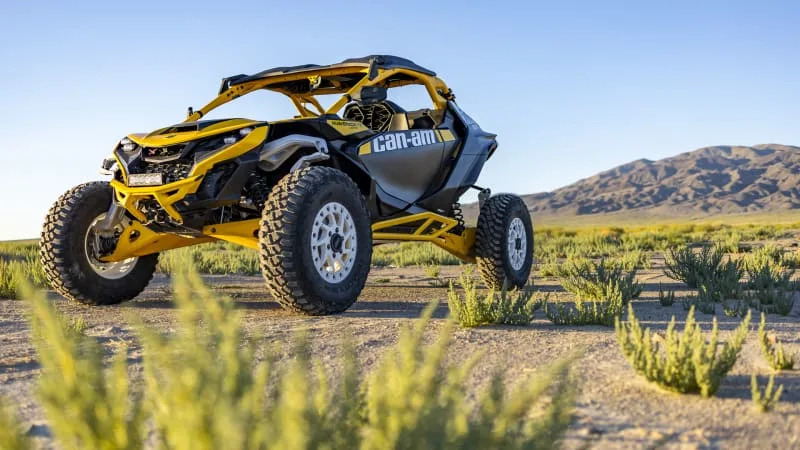
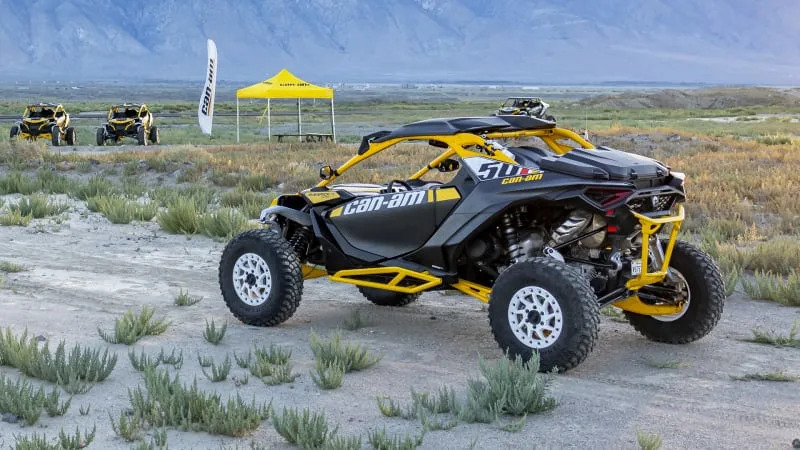
However, as good as the Maverick R is to drive, the navigation system on the new 10.25-inch touchscreen could use some finessing. Unlike the RideCommand system offered by Polaris with built-in navigation, the Maverick requires me to connect a phone to the system in order to see the route. In my rig it never works, and other folks have the same issue. If you purchase a Maverick R, be sure to go through the nav system before you leave the dealership to be sure it’s all in working order.
Having said that, I love that the touchscreen works when wearing gloves and the digital gauges are big enough to see while romping through the desert. Below the screen is a touchpad of physical buttons that bring up customization options for suspension. Those on-screen icons can be a bit harder to read at speed and I wish Can-Am allowed for two customized drive modes with a button on the steering wheel to switch between the two.
The 2024 Maverick R is available in four trims. The base model starts at under $36,000, which is an absolute smoking deal for this kind of performance. Upgrade to the $38,400 Maverick R X for the touchscreen, a full roof and a rearview camera. For $42,600, the Maverick R X rs adds larger rear shocks, 32-inch Tenacity tires on 16-inch beadlock wheels, while my tester, the top R X rs with Smart-Shox, goes for $44,300. You can add options like a glass windshield, upgraded audio system, rock sliders and the like, bundled into packages that can cost more than $19,000. Yikes. Fortunately, items are also available a la carte.
The 2024 Can-Am Maverick R provides the means to rip around the desert like a pro. If you buy one, I encourage you to get some driver training and find a responsible group of people to ride with. Always wear a helmet and wear your seatbelt. Finally, educate yourself on Tread Lightly principles. Just because a Maverick R can go pretty much anywhere, doesn’t mean it should. Keep it to marked trails, people.
Read the full article here


